Marketing leaders face a new operational challenge: performance data is abundant, but decision cycles are slowing. Teams are buried under fragmented reporting, rising acquisition costs, and pressure to show measurable ROI. What’s missing isn’t more data—it’s the ability to convert it into timely, actionable strategies at scale.
This article examines how AI is transforming digital marketing, including what AI marketing strategies actually entail in practice, the key benefits for revenue teams, and common misconceptions to avoid.
What Is AI Marketing?
The question that bothers everyone in the marketing sphere — is AI marketing legit? Yes, AI marketing is legit.
Many businesses and organizations have successfully integrated AI into their marketing efforts, resulting in improved customer targeting, personalized experiences, data analysis, and overall campaign performance.
The effectiveness of AI in marketing is well-documented, and its applications range from chatbots and predictive analytics to content recommendations and customer segmentation.
The Core Benefits of AI in Marketing
When implemented correctly, AI can significantly enhance marketing outcomes by offering the following advantages.
1. Operational efficiency
AI streamlines marketing operations by automating repetitive tasks, reducing manual effort, and minimizing errors.
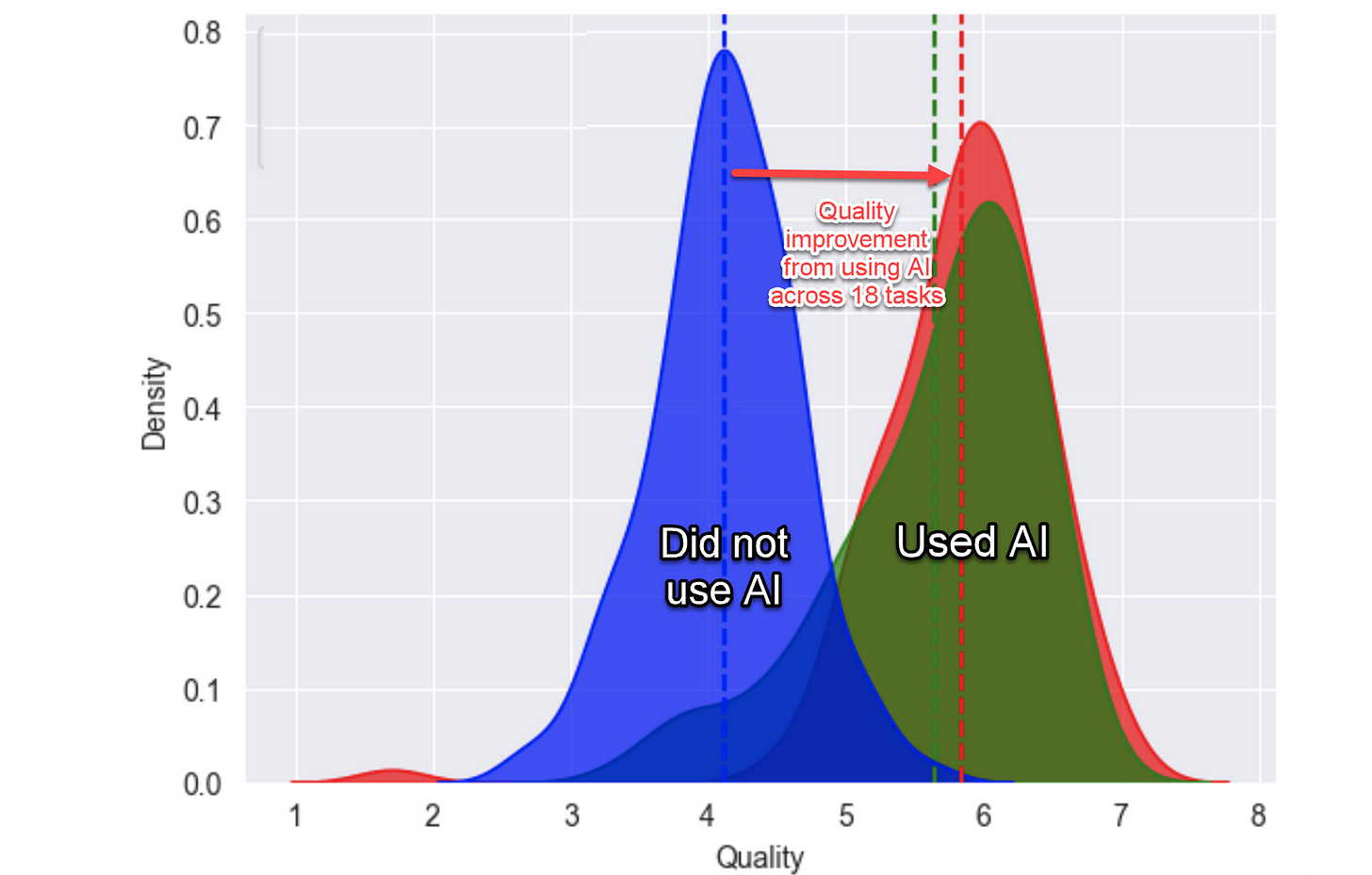
We already have stats proving the transformative effect of AI on operational efficiency. A group of social scientists from Harvard Business School studied how ChatGPT-4 affects the daily work of a global management consulting firm.
The study has shown that: Specialists using AI finished 12.2% more tasks on average, completed tasks 25.1% more quickly, and produced 40% higher quality results than those without.
In addition to that, a recent study found that only 22% of leaders see workforce reduction as AI's main goal, indicating that business value is a higher priority than cutting costs when it comes to AI.
2. Cost reduction and higher ROI
AI-driven marketing significantly reduces costs by eliminating manual processes and streamlining decision-making.
Let's take marketing analytics as an example.
Traditional reporting methods require hours of manual effort, from pulling data across multiple platforms to identifying trends and generating reports.
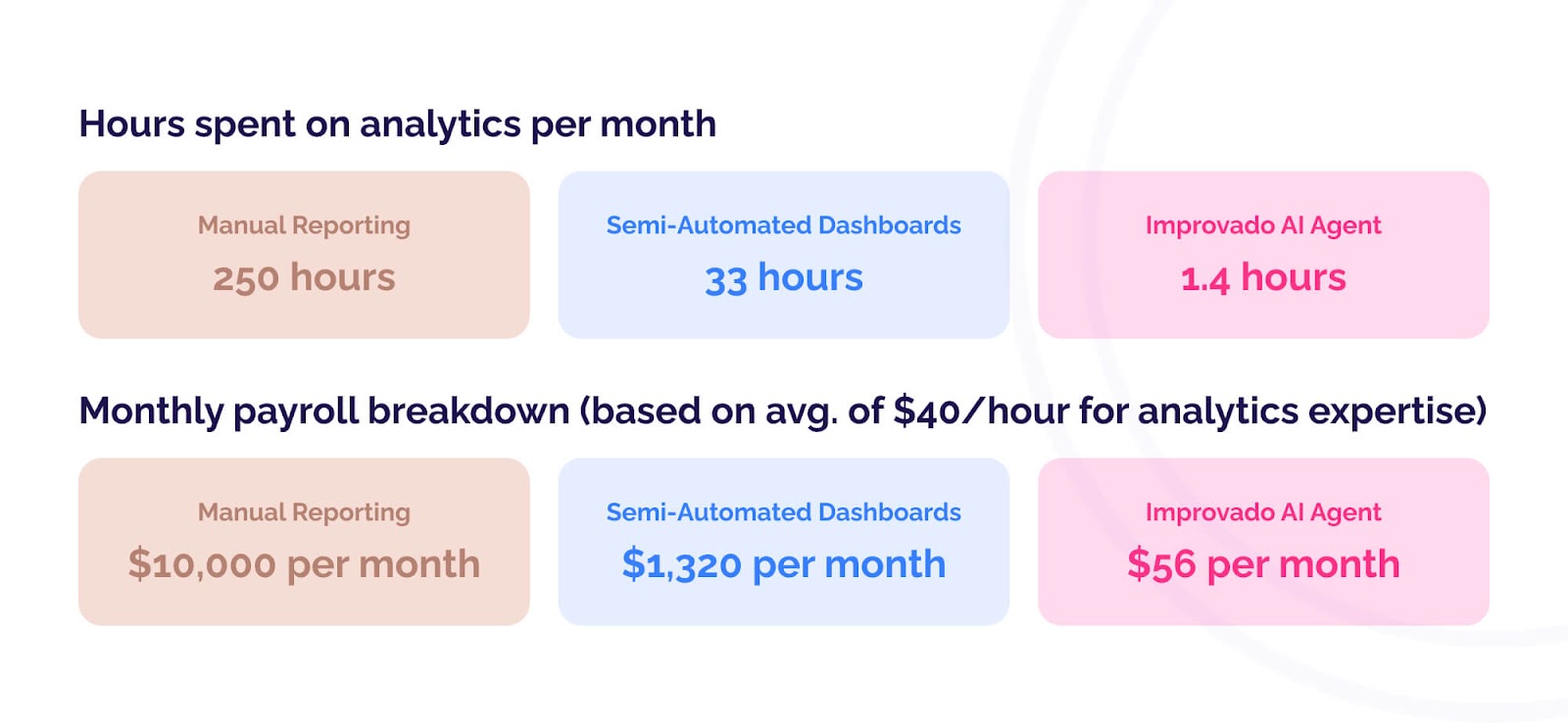
AI-powered analytics automate these processes, instantly extracting insights, detecting anomalies, and predicting outcomes—saving both time and labor costs. Going from manual reporting directly to AI Agents will save a company 99.5% of time and around $119,328 annually.
Even marketing teams that already use automated dashboards can cut costs further with AI-powered solutions. Enhancing dashboards with AI Agents will save you additional 95.8% of time and $15,168 annually.
3. Precision targeting
Beyond just analyzing customer data, AI-powered systems dissect intricate patterns within customer behaviors, interactions, and even micro-moments.
Deep Learning algorithms in AI evaluate a multitude of parameters: from user behavior and platform engagement rates to real-world events. By doing so, they unveil hidden trends and granular insights, allowing brands to mold their messages with an unmatched degree of precision.
Precision in targeting ties back to the previous point. AI-driven data analysis can reduce marketing campaign costs by up to 30%.
4. Content creation at scale
AI's role isn't limited to data crunching.
Natural Language Processing (NLP) capabilities enable AI to generate content that resonates with specific audience groups, from regional news reports to industry-specific articles, ensuring content remains both relevant and timely. However, using AI content for search ranking can’t be a viable option. Because Google can detect and penalize AI generated content, the large-scale impact of the March core update is a clear message from the search giant.
5. Hyper-personalization at scale
One of AI's most profound impacts is its ability to deliver hyper-personalized customer experiences at an unprecedented scale.
AI algorithms can analyze individual preferences, past interactions, purchasing history, and real-time behavior to tailor content, product recommendations, email campaigns, and even ad creatives to each specific user.
This level of personalization significantly boosts customer engagement, satisfaction, and ultimately, conversion rates, making every interaction more relevant and impactful.
Key Applications of AI in Digital Marketing
AI is no longer experimental in marketing. It is a strategic layer that scales execution, sharpens insights, and accelerates decision-making. Its value lies in augmenting human expertise, allowing teams to reallocate time from repetitive tasks to strategy and growth initiatives.
1. Content creation and optimization (generative AI)

Large language models (LLMs) have transformed content production.
Teams use AI to generate ad copy variations, social posts, outlines, and campaign messaging at scale.
Adoption is accelerating: over 50% of marketers now leverage AI in content creation and optimization.
Beyond generation, AI optimizes distribution by analyzing engagement data, surfacing winning formats, and suggesting adjustments for reach and SEO performance.
Leadership attention is still required: human oversight ensures authenticity, compliance, and alignment with brand voice.
2. Predictive analytics and forecasting
Machine learning models analyze historical and real-time signals to forecast customer behavior, sales, and identify risk of churn.
For marketing leaders, this means moving from lagging indicators to forward-looking strategy—whether reallocating budgets before underperformance compounds or identifying emerging segments early. Predictive models also enhance retention and revenue by directing campaigns toward audiences with the highest probability of conversion.
3. AI-driven SEO and content strategy
AI platforms are reshaping SEO by analyzing SERP dynamics, competitor strategies, and user intent at a scale humans cannot match. They identify high-value keyword clusters, content gaps, and opportunities to outrank competitors.
Real-time monitoring enables continuous content optimization, ensuring sustained visibility in search and stronger alignment between what audiences search for and what brands deliver.
4. Paid media optimization (PPC & social)
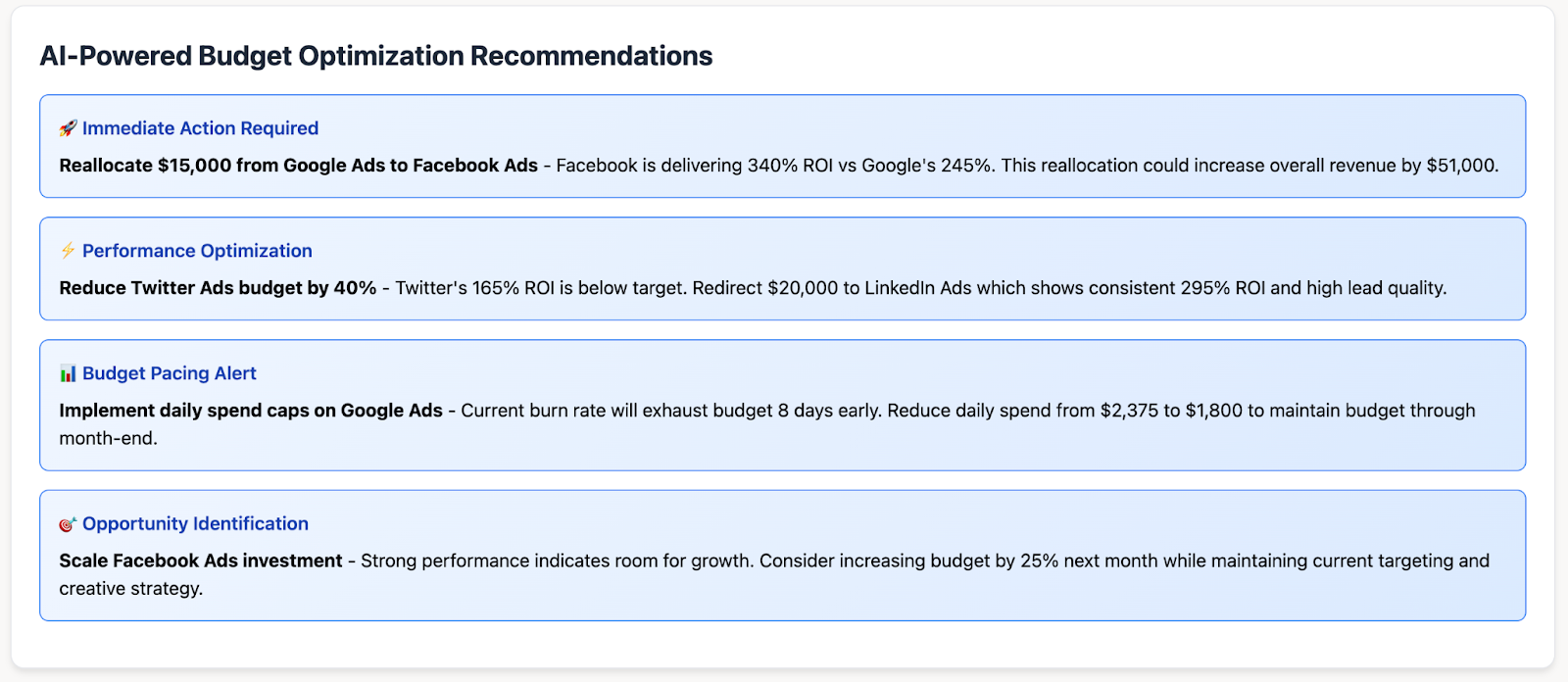
AI bidding algorithms now adjust in real-time, factoring in performance, competition, and budget caps across various platforms. They not only automate spend efficiency but also refine targeting, segmenting audiences by likelihood to convert.
Creative testing is accelerated with automated generation and rotation of ad copy and visuals, directly impacting ROAS and reducing campaign waste.
5. Email marketing precision
AI elevates automation into personalization at scale. Algorithms determine the best timing, segmentation, and dynamic content for every subscriber. Subject line optimization, triggered drip sequences, and personalized offers increase open and conversion rates while reducing list fatigue.
This ensures campaigns drive engagement and retention without adding operational overhead.
6. Customer service automation (AI chatbots)
AI chatbots handle high volumes of customer interactions 24/7, answering questions, guiding purchases, and escalating complex issues to human agents when needed - including advanced solutions like AI voice agents that enable natural, human-like conversations for smoother customer interactions.
Beyond cost efficiency, modern chatbots adapt through interaction data, providing tailored experiences that improve satisfaction and conversion.
This translates into scalable customer service without scaling headcount at the same rate, especially when combined with options to outsource chat support for handling more complex or high-touch interactions.
.
The Best AI Marketing Tools for 2026
The market for AI marketing tools is rapidly expanding, offering specialized solutions for various marketing functions. Choosing the right tools is crucial for successful AI adoption.
Tools for content generation & SEO
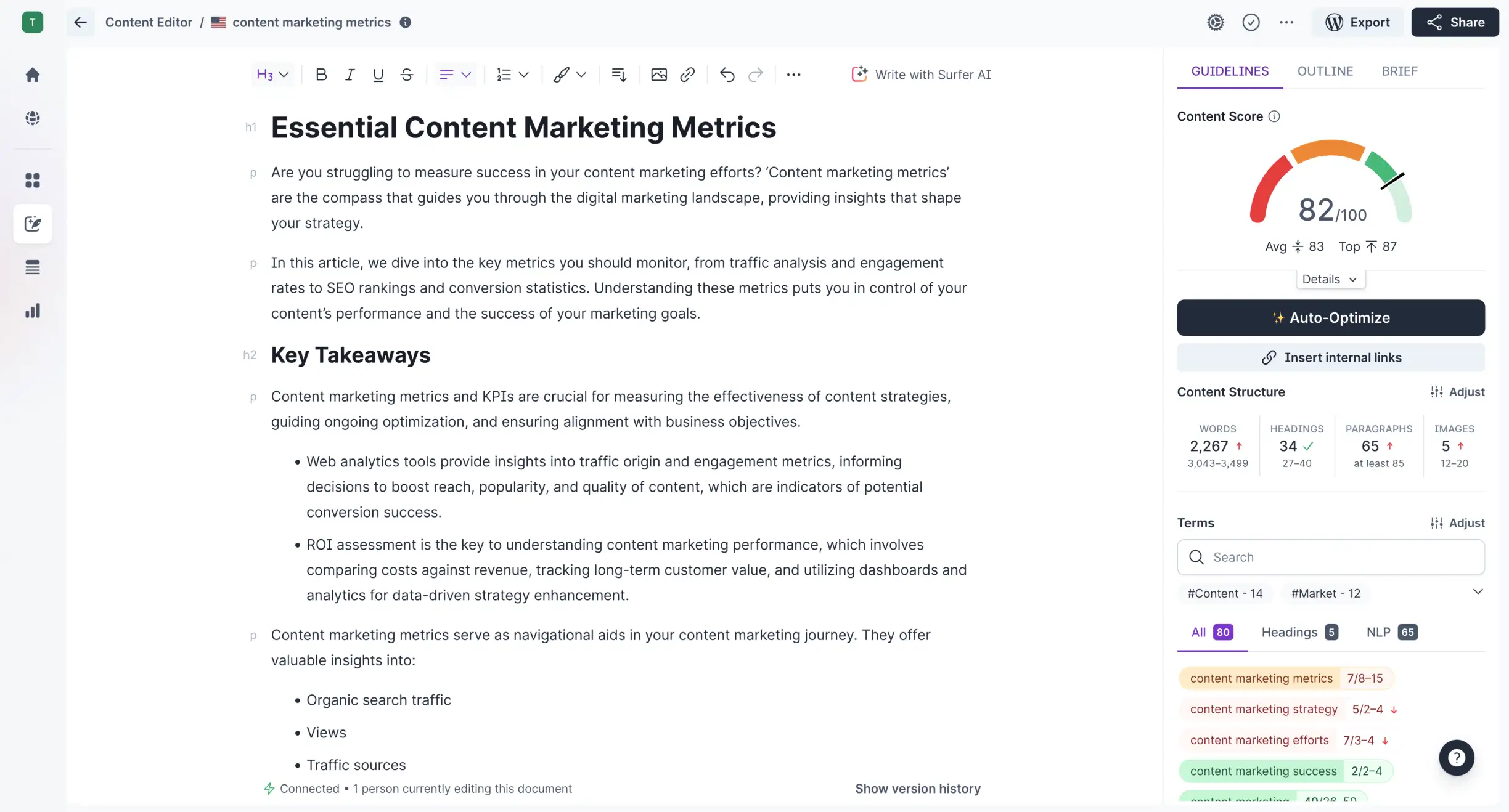
These tools leverage alternative AI and natural language processing (NLP) to assist with content creation and optimization for search engines.
- Jasper AI / Copy.ai: Popular for generating various forms of marketing copy, from blog posts and social media updates to ad creatives and email subject lines. They help overcome writer's block and scale content production.
- SurferSEO: An AI-powered content optimization tool that analyzes top-ranking content for a given keyword and provides data-driven recommendations for improving content structure, keyword density, and overall SEO performance.
- MarketMuse / Clearscope: Use AI to help identify content gaps, plan content strategies, and optimize existing content for topical authority and relevance.
Tools for customer data platforms (CDPs) & analytics
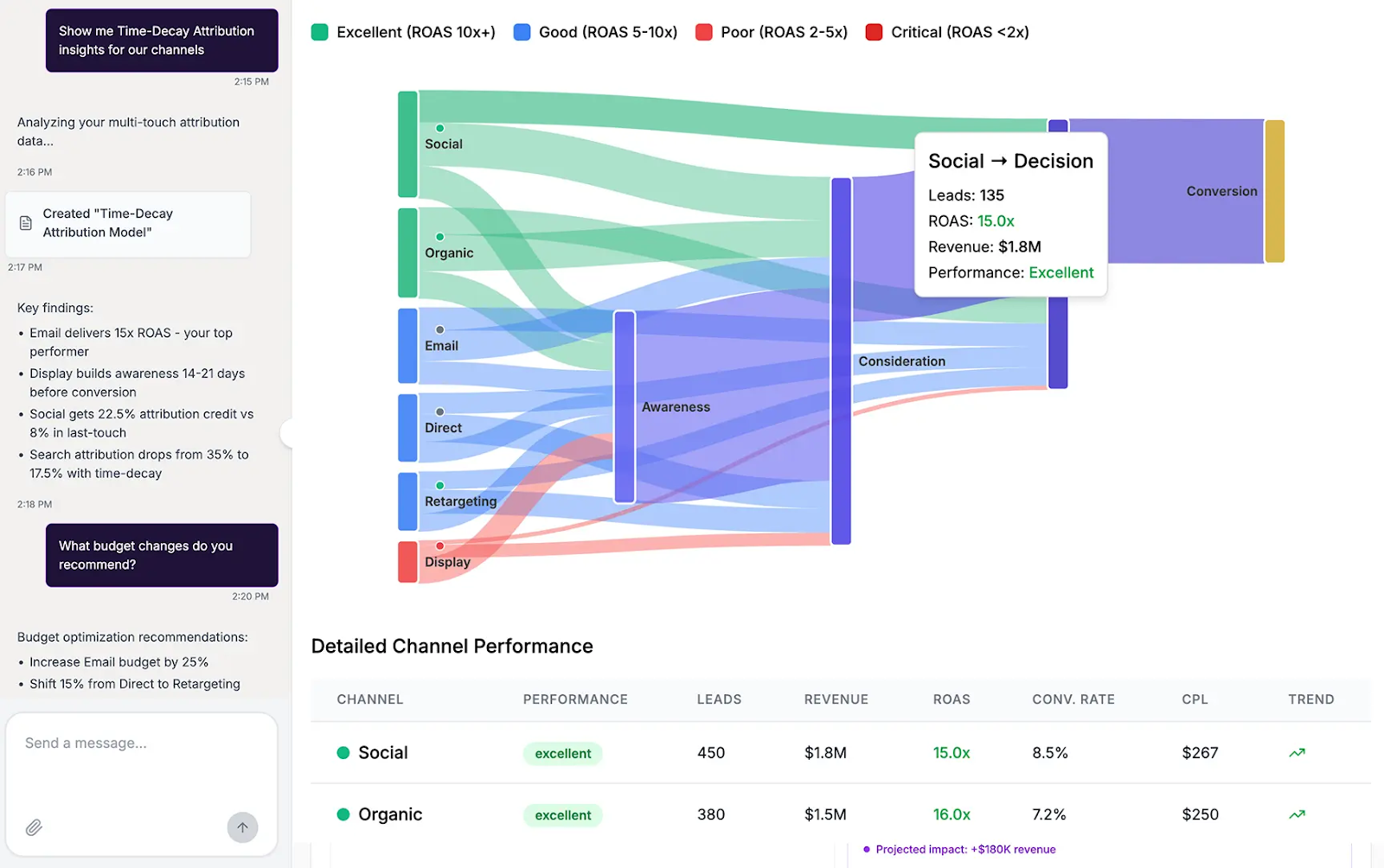
CDPs and analytics tools are foundational for AI, providing the clean, consolidated data necessary for AI models to generate reliable insights.
- Improvado: A marketing data and analytics platform that automates the collection, aggregation, and normalization of marketing data from hundreds of sources into a single source of truth. The clean, unified dataset is essential for reliable AI outputs and analysis. Improvado’s AI Agent further simplifies querying marketing data and discovering performance insights through a simple chat-like interface.
- Segment / Tealium: Leading CDPs that consolidate customer data from all touchpoints, creating unified customer profiles that can be used to power personalized experiences and AI-driven insights.
- Google Analytics 4 (GA4): Leverages machine learning for predictive metrics and automatically identifies trends and anomalies in user behavior.
Tools for marketing automation & chatbots
These tools automate repetitive tasks and enhance customer interactions.
- HubSpot / Salesforce Einstein: Comprehensive CRM and marketing automation platforms that incorporate AI for lead scoring, email optimization, content recommendations, and sales forecasting. Salesforce Einstein, in particular, integrates AI across its cloud services.
- Drift / Intercom: AI-powered chatbot platforms that provide instant customer support, qualify leads, and personalize website experiences through conversational AI.
Tools for social media management
AI enhances social media strategy by optimizing content, timing, and engagement.
- Hootsuite Insights / Sprout Social: These platforms use AI to analyze social media conversations, identify trends, monitor brand mentions, and optimize posting schedules for maximum engagement. They can also assist with sentiment analysis and influencer identification.
Common Misconceptions and Concerns Hindering AI Adoption
With any technological advancement comes a mix of enthusiasm, skepticism, and misconceptions. Let's address some of the most common myths and concerns surrounding AI in marketing.
1. AI marketing is just a buzzword
One prevalent notion is that AI in marketing is just another fleeting buzzword with more hype than substance. This perspective, however, does not align with the data-driven realities and the tangible impacts seen in the marketing landscape.
- B2B marketers in the U.S. using chatbots see an increase in their lead generation volumes by 10-20%.
- 58% of marketers from companies that adopted generative AI for content creation said increased performance is the top benefit.
We'll see more data as companies continue to leverage AI marketing tools in their day-to-day operations.
2. AI will replace marketers
Another concern is that AI will replace human marketers entirely. While AI can handle repetitive tasks and data analysis, it can’t replace humans for several key reasons.
- Genuine creativity, emotional intelligence, cultural awareness, ethical judgment, and strategic thinking remain uniquely human domains. AI can generate content based on patterns, but it can't truly innovate or understand the emotional resonance that drives customer engagement.
- Effective marketing requires collaboration across departments (sales, product, customer service) where human marketers serve as translators and advocates. This cross-functional coordination is something AI technology can't manage.
- Marketing frequently requires relationship management with stakeholders, clients, and executives—an inherently human process involving trust-building, negotiation, and mutual understanding.
3. AI marketing is too complex
Some believe that AI-powered marketing tools are too technical and complex. However, many AI tools are designed for non-technical users and created with an idea to democratize data.
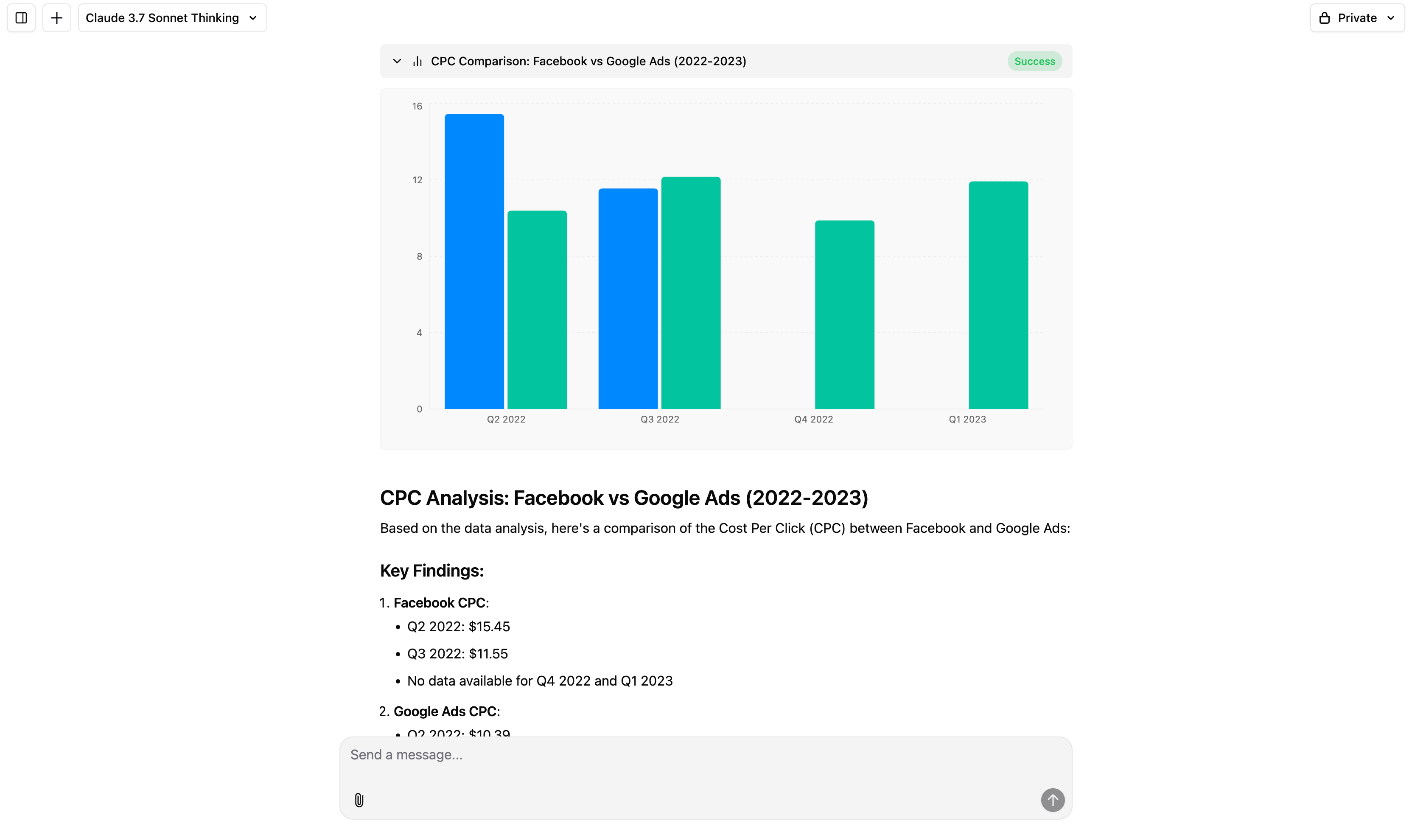
Improvado AI Agent debunks this myth. Leveraging text-to-SQL technology, AI Agent simplifies the querying of marketing data and the discovery of performance insights.
Instead of wrestling with complex analytics interfaces, users can ask straightforward questions about leads, campaigns, or budgets in an intuitive chat-like interface. In response, the AI Agent delivers data-driven answers based on your marketing dataset, accompanied by visual representations.
The complexity of AI is managed behind the scenes, providing users with a seamless and efficient experience.
4. AI compromises user privacy
Many consumers and even marketing professionals assume that AI-powered marketing necessarily means invasive data collection, surveillance-like tracking, and exploitation of personal information.
While privacy concerns exist and deserve serious consideration, this blanket belief oversimplifies a nuanced reality.
AI does utilize large sets of data to operate efficiently, and the key is in how the data is sourced, handled, and transferred.
- Some marketing organizations implemented AI-driven data minimization protocols that identify the minimal dataset required for effective personalization, reducing both privacy risks and storage costs.
- Other companies are shifting from user tracking toward contextual AI that analyzes content consumption patterns rather than individual user behaviors. Thus companies decode customer needs through understanding the environment rather than the person, dramatically reducing privacy implications.
- The marketing landscape now operates under stricter privacy frameworks (GDPR, CCPA, HIPAA, etc.) that establish clearer boundaries for data usage.
5. All AI marketing tools are the same
It's a common belief that if you've seen one AI marketing tool, you've seen them all. However, this is a significant oversimplification and underestimates the diversity in the AI marketing landscape.
Different AI marketing tools are often tailored for specific purposes. Some focus on predictive analytics, projecting future trends based on historical data. Others might specialize in content optimization, automating A/B tests to pinpoint the most effective messaging. Yet another set might emphasize chatbots and customer interaction.
The underlying algorithms and technologies can also vary considerably. For example, two tools might both utilize machine learning, but one uses a neural network model while the other employs decision trees. This distinction often leads to different outputs, accuracy levels, and insights.
The Future of AI in Marketing
The trajectory of AI in the marketing sector points towards a future filled with innovation and transformation. As we look ahead, here's what we can anticipate.
1. Day-to-day AI assistance
AI assistants, like Improvado AI Agent, are transforming the way marketers interact with data. The Assistant acts as a marketing analytics co-pilot, allowing marketers to directly pose questions and instantly access the insights they need.
Curious about how a campaign performs in a specific region or on a certain device? Or perhaps, there's a need to understand budget allocation for a set period? Have any other ad-hoc questions about performance? Just ask the AI Agent.
By seamlessly integrating text-to-SQL technology, it facilitates queries about campaigns, budgets, device performance, geographic insights, and more. It's not just about answering questions, it's about offering detailed, data-backed responses to drive informed decisions without manual labor or reaching out to data teams and waiting for their response.
2. Predictive customer journey orchestration
AI tools will evolve from reactive to truly proactive, anticipating customer needs before they arise. This will enable engagement strategies where brands address customer requirements before they're explicitly expressed, creating seamless experiences across the entire journey.
3. Autonomous marketing systems
For routine marketing functions, we'll see the emergence of autonomous systems that can plan, execute, optimize, and report on campaigns with minimal human oversight.
These systems will handle increasingly complex decision-making while still operating within strategic parameters set by humans.
How to Get Started with AI in Your Digital Marketing Strategy
Adopting AI into digital marketing is all about engineering a repeatable, scalable system that maps to business goals.This means building the foundations for accurate insights and long-term ROI rather than chasing one-off wins.
Step 1: Define business objectives with precision
AI adoption should begin with clearly defined, measurable outcomes. Vague ambitions like “get more efficient” or “improve personalization” are too broad to guide investment. Instead, leadership should identify whether the focus is:
- Lowering customer acquisition cost (CAC),
- Improving lead-to-opportunity conversion rates,
- Increasing customer lifetime value (LTV),
- Reducing churn, or
- Optimizing media spend efficiency.
For example, a VP of Marketing responsible for pipeline growth might prioritize predictive lead scoring, while a Director of Growth might look to AI-powered ad optimization to stretch budgets further.
Anchoring AI projects to board-level KPIs ensures adoption aligns with outcomes that matter to the business.
Step 2: Build a unified data foundation
AI is only as strong as the data it ingests.
In practice, most organizations face fragmentation: ad spend data in Google Ads, engagement data in GA4, retention metrics in Salesforce, and offline sales tracked in spreadsheets. Without consolidation, AI models will surface incomplete or even misleading insights.
The solution is to centralize marketing and sales data into a single source of truth.
Automated integration platforms like Improvado handle API complexity, schema changes, and normalization across 500+ sources. Instead of wasting operations hours stitching CSVs together, marketing teams get governance-ready datasets where metrics like cost, impressions, and conversions are consistent across all channels.
This foundation is non-negotiable. Without it, predictive models misclassify opportunities, attribution models misalign spend, and personalization efforts fail to scale. With it, every AI initiative—whether content optimization, budget allocation, or retention modeling, operates on accurate, complete, and timely data.
Step 3: Select AI tools that align with strategy
Once objectives and data foundations are set, tool selection becomes a strategic exercise rather than guesswork.
Leaders should look beyond feature checklists and ask:
- Does this tool directly support our business objectives?
- Will it integrate cleanly with our data stack and workflows?
- Does it support governance and compliance at the scale we need?
For example, if improving media efficiency is the goal, AI bidding and creative testing platforms should be prioritized.
If churn reduction is the priority, predictive analytics tied to CRM data may be more impactful.
Generative AI can accelerate campaign content, but only if governance ensures output remains on-brand and compliant.
Executives should also consider the total cost of ownership: integration, onboarding, and required oversight. The best AI tools reduce operational drag, not add to it.
Step 4: Pilot, measure, and scale
AI adoption is iterative.
The most successful organizations begin with small-scale pilots that tie directly to a single KPI. For example, testing AI-driven audience segmentation on a single campaign or running predictive churn models for one region.
Results should be benchmarked against the defined objectives: Did CAC decrease? Did LTV grow? Did campaign ROI improve? Feedback should also be collected from teams—was the tool intuitive, did it replace manual tasks, or did it create new overhead?
From there, successful pilots should be scaled methodically.
Expansion isn’t just about adding more campaigns, it’s about integrating AI into standard operating procedures. This includes governance for data quality, regular model retraining, and continuous monitoring of ROI.
.png)




.png)
